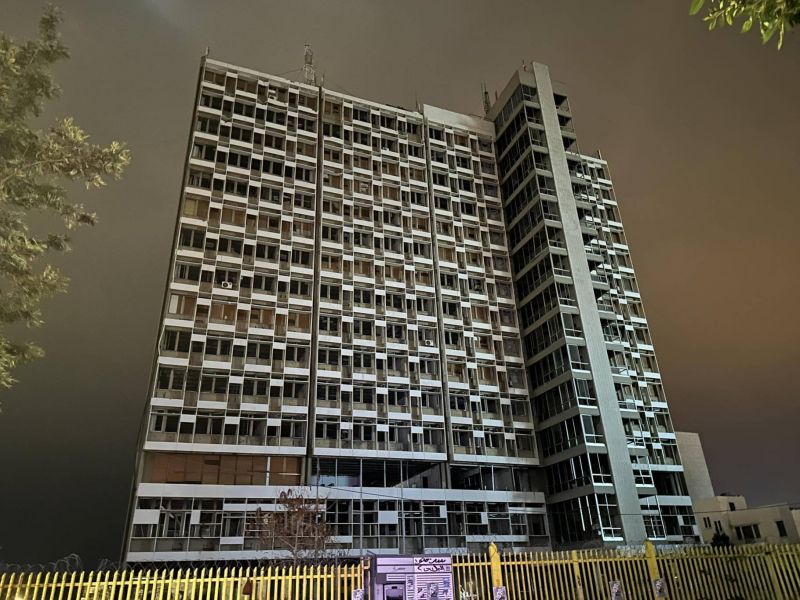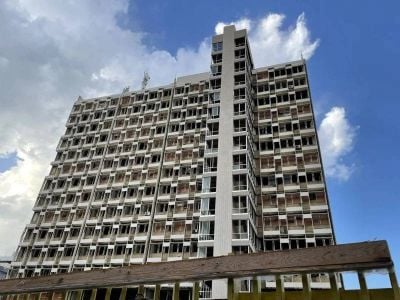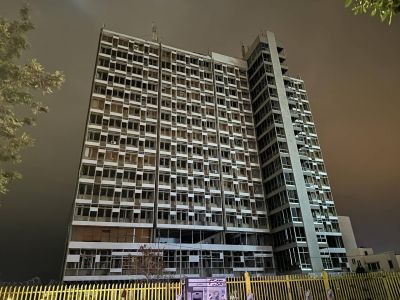
The Electricité du Liban Building in Beirut. (Credit: Mario Doueiry/L'Orient-Le Jour)
BEIRUT — With last week's blackouts fresh in the minds of Lebanese, electricity production is once again at the center of a political and financial imbroglio concerning the fuel shipments needed to supply the public provider's power plants.
A new showdown pits Energy Minister Walid Fayad, associated with the Free Patriotic Movement, against caretaker Prime Minister Najib Mikati and the Ministry of Finance, led by Youssef Khalil, associated with the Amal movement.
The FPM is notoriously at odds with both Mikati and Nabih Berri the Parliamentary Speaker and Amal chief.
In a statement released Friday, the Ministry of Energy called on individuals with “questions” about power rationing to direct them to the responsible authorities, namely the government, the Finance Ministry and the central bank.
Against the backdrop of years of recurring power cuts, the statement accused those with 'different discourse' of misleading public opinion and having a bias against the private generator sector, a flourishing market in the country.
No production increase without ships
The ministry justified a funding request sent to the Ministry of Finance for the payment of “58 million dollars” to be paid for the import of fuel for power plants.
Without this fuel, “the implementation of the electricity plan and the increase in production cannot continue,” it estimated, emphasizing that this fuel is necessary “in addition to Iraqi fuel,” obtained through a recently extended agreement with Baghdad. The ministry recalled that the requested funds are normally allocated “from an amount of $300 million granted to EDL [Electricité du Liban] through a government decision published in the official gazette last January, of which only $193 million have been used so far, leaving $107 million. The request for opening a $58-million line of credit “has been approved by the minister of finance, and the central bank of Lebanon is obligated to execute it,” the ministry added.
A source at the ministry confirmed to L'Orient-Le Jour that “without the fuel ships, the promise to provide 10-12 hours of electricity to the Lebanese people is impossible to fulfill.”
It's worth noting that the acting governor of the central bank, Wassim Mansouri, had committed to no longer disbursing funds to the government in the absence of a law passed by parliament, which outlines repayment of the amounts granted to the state.
For his part, Mikati stated to local media that he would not authorize the opening of any new line of credit to finance fuel for EDL, and he criticized Fayad for not launching proper bidding processes for fuel imports. Some media outlets also accused the energy ministry of importing fuel when EDL's reserves are currently at capacity.
The aforementioned source has denied this last allegation. They say these reserves would only provide electricity for “two days, if we want to ensure 10-12 hours of electricity per day.”
They also explained that the imported stocks are necessary despite the import of Iraqi fuel, which cannot be used as is and must be exchanged through a bidding process, during which the product loses value and is then delivered in smaller quantities.
Finance Ministry's response to the accusations
The finance ministry has distanced itself from any responsibility regarding the power shortages and confirmed that it had sent a request to open a $58,877,946 line of credit in favor of Coral Energy DMCC early last week. 'Thus, it is the responsibility of the energy ministry to publicly explain the reasons for the current delay in fuel imports, the ministry added.
Friday's imbroglio occurred following a blackout that hit Lebanon for several hours mid-week, after Primesouth, the company operating two power plants on behalf of EDL, shut down the Deir Ammar (North Lebanon) and Zahrani (South Lebanon) plants on Wednesday to protest the accumulation of overdue payments from the state. The two plants resumed electricity production Thursday evening, less than 24 hours after the shutdown, following an agreement reached with the government, which involved paying Primesouth using Lebanon's Special Drawing Rights from the International Monetary Fund.
EDL also explained in a statement Friday that its inability to make its payments was not due to a lack of funds but rather a problem related to the conversion mechanism of its revenues obtained through bill payments. EDL expressed satisfaction for having achieved a “deficit-free” financial balance for the first time in years.

